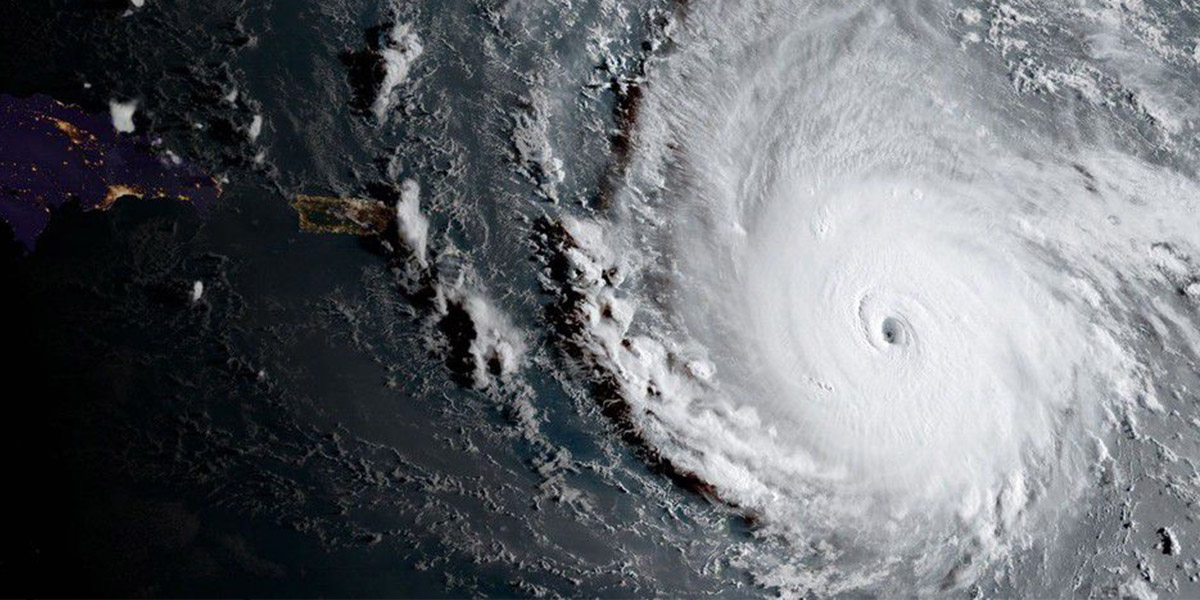NPS Researchers Advance Infrastructure Resilience Plans for the US Virgin Islands - Energy Academic Group

A NOAA satellite image shows Hurricane Irma as a Category 5 hurricane on Sept. 5, 2017. (NOAA photo)
NPS Researchers Advance Infrastructure Resilience Plans for the U.S. Virgin Islands
By Dan Eisenberg, PhD, Department of Operations Research, NPS
In September 2017, two Category 5 hurricanes—Irma and Maria—made indirect hits on the U.S. Virgin Islands (USVI) destroying critical infrastructure systems that provide electricity, water, mobility, and communications, devastating local communities. Since this double disaster, the Federal Emergency Management Agency (FEMA) funded the Naval Postgraduate School (NPS) Center for Infrastructure Defense (CID) and the Energy Academic Group (EAG) to support recovery and mitigation efforts in the USVI. This three-year collaboration, led by Drs. David Alderson and Daniel Eisenberg of the NPS Operations Research Department, links stakeholders across the University of the Virgin Islands (UVI), territorial utilities, federal agencies, and national labs to produce practical modeling and analysis tools for the USVI.
To date, NPS researchers alongside eight NPS military officer students produced vulnerability and resilience analyses across electric power, water, transportation, and telecommunications systems. Each study addresses topics relevant to local stakeholders, such as measuring how blackouts impact potable water delivery, how floods impact local supply chains and disaster relief, and how loss of cell phone towers impact coverage and communications across each island. In total, this collaboration produced data sets, models, analysis tools, and visualizations helpful for guiding decisions and managing
future hazards.
The recent 2020 Hazard Mitigation and Resilience Planning (HMRP) workshop held on November 5th and 6th online demonstrates the impact of NPS work. This workshop led by Drs. Greg Guannel and Kim Waddel of UVI was the 3rd annual event to present the latest understanding of territorial hazards and to hold expert elicitation on territorial needs. The workshop series is meant to support the next USVI hazard mitigation and resilience plan, which is a federal requirement to receive FEMA funds for future disasters.
NPS assessments are at the heart of the HMRP workshop results, recommendations, and plan. Drs. Alderson and Eisenberg worked closely with Drs. Guannel, Waddel, and their team to shape the workshop and organize analyses to support territorial resilience to hazards as broad as hurricanes, earthquakes, tsunamis, and drought. Together, NPS faculty and student-led research will directly influence future disaster mitigation and recovery activities in the USVI. In turn, this work may influence billions of dollars when the territory experiences its next major disaster.
Success for the USVI is also success for the U.S. Navy and Department of Defense services. Models and decision-tools developed for the USVI support analyses for systems at similar operational scales—specifically military installations. As a result, Drs. Alderson and Eisenberg are also leading projects to transition models developed for the USVI to military contexts, by linking infrastructure operations to missions and conducting case studies of DoD installations.
LEARN MORE
For more information on USVI research efforts and military installation resilience, visit the USVI HMRP website at https://resilientvi.org
For more information about the Naval Postgraduate School's Center for Infrastructure Defense, visit the NPS CID website at https://www.nps.edu/cid
Email Dan Eisenberg at daniel.eisenberg@nps.edu
Quarterly Newsletter
Surge is published quarterly by the Energy Academic Group and covers a divese range of energy-related topics. View archive

